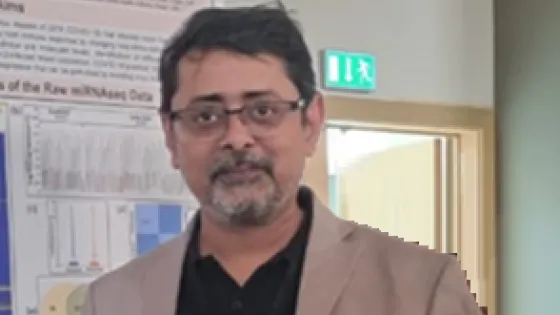BSB Seminar Series: Molecular Mechanisms to Global Biomedical Solutions
Diagnose earlier and treat smarter is my policy to find cure for human diseases. The investigation of the disease progression at genome and proteome level can accurately tell us the medicinal tools to fix the problem.
Speakers
Event series
Content navigation
Description

ABSTRACT
Diagnose earlier and Treat smarter is my policy to find cure for human diseases. The investigation of the disease progression at genome and proteome level can accurately tell us the medicinal tools to fix the problem.
COVID-19 infected over 777 million individuals globally and caused over 7 million deaths to date. SARS-CoV-2 virus attacks host microRNAs to enhance its replication and modulates host immune responses. We recently identified miRNA-based biomarkers in participants from 40 different nationalities residing in the United Arab Emirates. These host miRNAs not only demonstrated potential interactions with the viral genome but also showed strong correlations with clinical diagnostic markers to highlight their prognostic value in differentiating disease severity.
Breast cancer remains a leading global health problem with more than 3 million new cases diagnosed till now. The Mouse Mammary Tumor Virus (MMTV), a beta retrovirus is known to cause breast cancer in mice also been implicated in human breast cancer as Human Mammary Tumor Virus (HMTV) via zoonosis (specie jump). Interestingly, our sequence analyses indicated that HMTV should not be classified as a separate specie without further full-length analysis of its genome data. The reported MMTV sequences in the human breast cancer by other researchers could be due to the possible contamination. However, our ongoing studies reveal novel insights into MMTV as a promising agent in gene therapy. The extra safety features added in MMTV vector made them safer and efficient for gene delivery using a self-inactivation method. Our US patent for this work is in progress.
Another global health disease in human is liver cancer caused by Hepatitis C virus (HCV). We investigated the prevalence, transmission patterns, genotypes, and clinical profiles of HCV in a large cohort of 3,160 patients in Pakistan. Through genotype–serum marker correlation and gene expression analysis in HCV-infected individuals with liver fibrosis and cirrhosis, we identified key genetic biomarkers and developed the non-invasive Fibrosis-Cirrhosis Index (FCI)—a blood-based diagnostic tool now referenced in NIH clinical trials, offering a reliable alternative to liver biopsy.
Aging and metabolic disorders are well-established contributors to Alzheimer’s disease (AD), often referred to as type III diabetes. I investigated the role of glucose metabolism in AD pathogenesis in C. elegans model. Notably, we demonstrated that suppression of the core metabolic gene dld-1, along with the use of anti-diabetic agents such as metformin, MICA, and AICAR, significantly alleviated AD-related pathology. Our findings revealed that glucose enrichment exacerbates amyloid beta toxicity and tau phosphorylation that could not be reversed by inducing O-β-GlcNAcylation suggest that glucose-based therapies are unsuitable for AD patients.
I am committed to contribute my part in global health research through my scientific endeavors in academic and commercial settings. My journey is continued....
BIOGRAPHY
Dr. Waqar Ahmad is an accomplished biomedical scientist with over 20 years of experience in molecular biology, bioinformatics, and translational research. He earned his PhD from The University of Queensland, Australia, where he investigated metabolic mechanisms in Alzheimer’s disease using C. elegans models. Currently, Dr. Ahmad is a Medical Research Specialist at UAE University, leading projects on gene therapy, cancer biology, and viral pathogenesis.
He is best known for developing the Fibrosis-Cirrhosis Index (FCI), a non-invasive diagnostic tool now referenced in NIH clinical trials. His research also includes pioneering work on microRNAs in SARS-CoV-2, mouse mammary tumor virus (MMTV), and host-pathogen gene regulation. With over 50 peer-reviewed publications and numerous international presentations, Dr. Ahmad has a strong track record in systems biology and RNA-based therapeutics.
Although based in the UAE, Dr. Ahmad’s family resides in Canberra, and he is actively seeking opportunities within Australia. His presentation today reflects this vision—sharing his research journey and exploring areas of synergy with ANU’s molecular biology and gene regulation community.
Location
Please note: this seminar will be held in the Eucalyptus Seminar Room and via Zoom, details are included below.
Eucalyptus Seminar Room, S205,
Level 2, RN Robertson Bldg (46)
Please click the link below to join the webinar:
https://anu.zoom.us/j/85320234737?pwd=q7wOUf3ZWtMTU9VtJDKdRhJcN4QLix.1
Webinar ID: 853 2023 4737
Passcode: 184449
Canberra time: please check your local time & date if you are watching from elsewhere.


